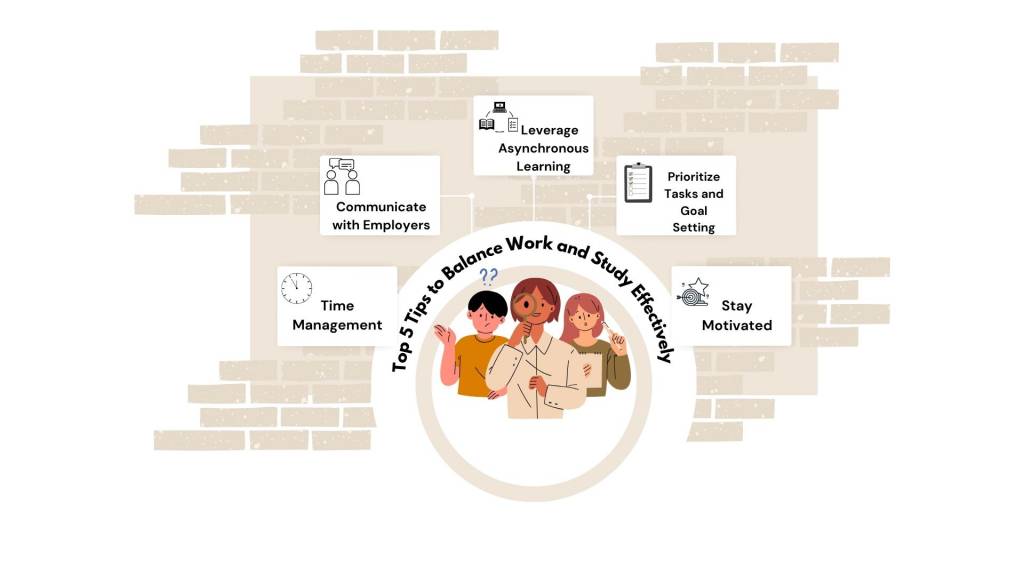How to Balance Work and Study: Tips for Succeeding in Online Degree Programs
Pursuing an online degree while working demands strategic time management and open communication with employers. Leverage asynchronous learning tools, prioritize tasks effectively, and stay motivated by setting achievable goals and celebrating milestones. Embrace flexibility, but cultivate self-discipline to ensure academic and professional success.
The growing popularity of online degree programs has revolutionized the way individuals pursue higher education. These programs offer flexibility and accessibility to those who aim to balance academic pursuits with professional and personal commitments. However, managing the demands of work and study can be challenging.
Effective time management, open communication with employers, and leveraging the advantages of asynchronous learning are crucial for success. Establishing dedicated study space, prioritizing self-care, and utilizing university resources can further support the seamless integration of work and education.
By implementing practical strategies, individuals can navigate the path to academic achievement while maintaining a healthy work-life balance. Let’s understand!
Table of Content
Top 5 Tips to Balance Work and Study Effectively
Best-suited Digital Transformation courses for you
Learn Digital Transformation with these high-rated online courses
Time Management
Managing a job and degree can be a bit tricky, but it's not that difficult if you already know how to manage your time effectively. The online programs are designed keeping working professionals in mind offering flexibility and convenience,
For instance, Universities offering online courses strategically schedule live classes on Saturdays and Sundays, which are mostly corporate weekoffs. This thoughtful approach allows professionals to attend virtual lectures and discussions without conflicting with their weekday work commitments.
It's crucial to proactively plan your schedule, taking into account not only your job responsibilities but also the demands of your online degree program, including exams and assignments. Dedicating 1-2 hours daily to self-study, besides attending online classes will help you avoid last-minute hustle.
Communicate with Employers
Being upfront and maintaining an open dialogue with your employer is crucial when pursuing an online degree alongside your job.
For instance, some companies have a policy of rotational weeks off, so you can talk to your employer about your weekend classes and plan the week off accordingly. Also, if you are unable to attend live classes, you can take recorded classes on weekends.
Many employers recognize the value of continuing education. They may be willing to accommodate reasonable requests, especially if you can demonstrate how your newfound skills and knowledge will benefit the company.
Additionally, inquire about any tuition assistance programs or professional development initiatives your company offers, as these could potentially offset some of the financial burdens of your degree.
Leverage Asynchronous Learning
Online education offers inherent flexibility, allowing you to navigate your studies around your personal and professional commitments. One key advantage is the ability to learn asynchronously, liberating you from the constraints of fixed class schedules.
Most online courses provide access to pre-recorded lectures, module notes, and other course materials, enabling you to consume the content at your convenience. This self-paced approach is a game-changer for busy professionals juggling work, family, and academic responsibilities.
If you cannot attend a live virtual session, don't panic! Simply review the recorded session later, during a time that better aligns with your availability. This asynchronous access ensures you don't miss out on crucial information or fall behind in your coursework.
Prioritize Tasks and Goal Setting
Striking the right balance between work commitments and academic pursuits requires strategic prioritization and effective goal-setting. Clearly define your long-term career goals and how this educational endeavor aligns with them. This clarity will help you stay motivated and focused, even when the workload seems overwhelming.
Break down your overall goals into smaller, achievable milestones. It includes completing a specific course or maintaining a target grade point average.
Next, conduct a thorough assessment of your existing workload and responsibilities, both professional and personal. Identify potential time conflicts and areas where you may need to readjust your priorities or seek assistance.
Develop a comprehensive schedule that allocates dedicated time blocks for work, study, and personal activities.
Stay Motivated
It's paramount to stay motivated while pursuing your online degree and juggling the demands of a job. When you feel discouraged or like giving up, it’s necessary to look for the “why” you started this in the first place. Keeping the reasons at the forefront of your mind can reignite your passion and fortify your determination.
Universities also care about you. To boost your motivation, they have implemented innovative strategies to encourage and inspire their students. A common approach is offering digital badges or micro-credentials for achieving specific milestones or excelling in particular areas.
For instance, universities may provide you with badges upon completing assignments or modules, acknowledging your progress and hard work. Additionally, they often bestow special badges to top-performing students who achieve the highest marks. This fosters a healthy sense of competition and drives others to strive for academic excellence.
These tangible achievements not only serve as a source of pride and accomplishment but can also be showcased on your resume or professional profiles. highlighting your dedication and outstanding performance throughout your online degree journey.
Conclusion!
Balancing work and an online degree program requires careful planning, time management, and unwavering determination. However, you can successfully navigate this challenging journey by communicating openly with employers, leveraging asynchronous learning, prioritizing tasks effectively, and staying motivated through goal-setting and institutional support.
Embrace the flexibility of online education while cultivating self-discipline, and remain focused on your long-term aspirations. With the right strategies and mindset, you can achieve academic excellence while maintaining professional commitments.

Chanchal is a creative and enthusiastic content creator who enjoys writing research-driven, audience-specific and engaging content. Her curiosity for learning and exploring makes her a suitable writer for a variety ... Read Full Bio



